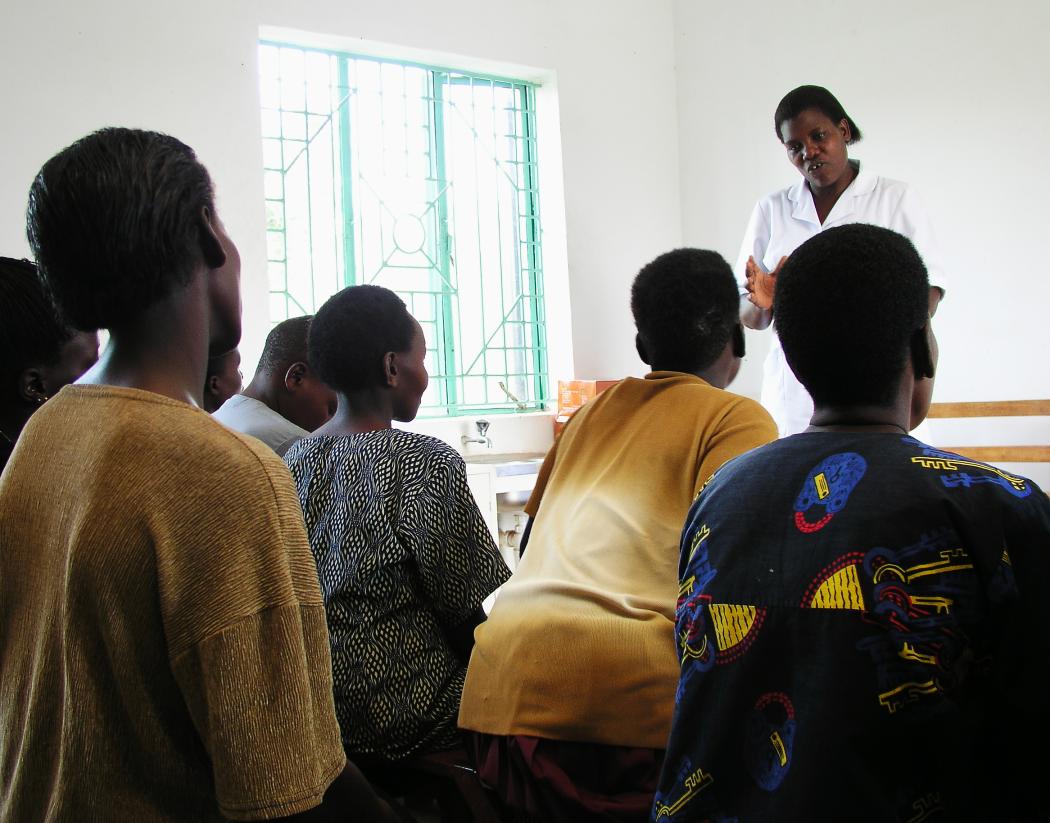Frontline Voices for Sexual and Reproductive Health in Universal Coverage Efforts

Mothers and pregnant women attend a health education session in Mukono. Photo credit: Arne Hoel / World Bank
Universal Health Coverage (UHC) is the hot topic in development circles, enticing health officials, governments, civil society, and other stakeholders with the promise of affordable, accessible health services to all—reducing poverty and improving wellbeing in the process. Preparations are underway for September’s UN High-Level Meeting on UHC, where governments will renew their commitments to achieving UHC by 2030, reaching the more than 3 billion people who lack the health services they need, and the approximately 100 million people who are impoverished by healthcare costs annually. But to truly achieve UHC—and realize its health, economic, and social benefits—governments must advance a UHC agenda that recognizes and prioritizes sexual and reproductive health (SRH) services. Advocates, including frontline health workers, can play a powerful role in ensuring that governments and policymakers pay attention and take action.
SRH services—and sexual and reproductive health and rights (SRHR) more broadly—are fundamental to people’s overall health and wellbeing. While numerous international agreements recognize both the rights and health imperatives to SRH, including access to maternal health services, family planning, safe abortion, and information and education, many of the 4.3 billion people of reproductive age globally will have inadequate access to SRH services at some point during their lifetime. Girls and women are more likely to face cultural, structural, and financial barriers to accessing these services. This threatens their health and wellbeing, perpetuates gender inequality and power imbalances, and denies them their right to make decisions about their own bodies and fertility.
Due to political and cultural sensitivities, SRH services are too often overlooked and deprioritized in policy, decision-making, and service provision. Today, conservative winds around the world challenge global progress on SRHR. But we cannot afford for it to be sidelined in UHC. On International Universal Health Coverage Day, we have the opportunity to plant our flag and advocate for the necessary role of sexual and reproductive health and rights in UHC.
Not only are SRH services fundamental from a rights-based perspective, they are essential to quality preventative care, are cost-effective, and have ripple effects on broader sustainable development. The Guttmacher-Lancet Commission on Sexual and Reproductive Health and Rights found that providing a comprehensive SRHR package would cost only US $9 per person, per year. This small investment could potentially reduce unintended pregnancies by 75%, induced abortions by 74%, maternal deaths by 73%, and newborn deaths by 80%. Bodily autonomy and reproductive choices are linked to increased education, productivity, and lifetime earnings. In addition, investing in SRHR brings broad socioeconomic returns: A cost-benefit study of 74 countries found that increasing contraceptive use can boost economic productivity and lifetime earnings, generating returns that could exceed 10% of GDP by 2050 in some countries.
UHC efforts that prioritize SRHR promise to foster strong, equitable, and holistic health systems that recognize and respond to essential needs of all. Frontline health workers are key to achieving this vision, and prioritizing and incorporating SRHR into UHC.
As trusted and knowledgeable community members, frontline health workers can be strong and effective advocates, ensuring that no one is left behind. By expanding access to family planning, antenatal care, or safe abortion care for women in rural areas; promoting preventative health initiatives that tackle harmful gender norms and stigma; and strengthening referral systems, frontline health workers truly understand the far-reaching benefits of SRH services and see firsthand the obstacles and inequities surrounding SRH services. With deep community connections, frontline health workers can help mobilize communities, the health workforce, and other stakeholders to advocate for a rights-based approach to health, and demand that comprehensive SRH services be included in both UHC policy dialogues and country-level service packages.
Together, advocates can create a movement. We can work together to create an enabling environment where SRH services are recognized and addressed in UHC, and make sure that health workers have the resources, supplies, and trainings they need to effectively deliver comprehensive services. This includes advocating with governments to increase investments in UHC, and in SRH interventions in particular. Frontline health workers are an essential part of the way forward, they can call for UHC that delivers on SRHR for girls and women, so that girls and women are able to realize their rights.
